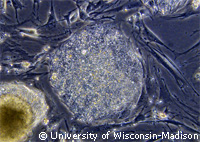World stem cell hub launched in Seoul
An international initiative to help scientists avoid national restrictions on stem cell research was announced in Seoul, South Korea, on October 19. A ceremony celebrated the opening of the first branch of this global centre, an international stem cell bank at Seoul National University Hospital. Woo Suk Hwang, famed for cloning the world's first dog, Snuppy, will head the new institute, and said the hub would advance research on finding cures for incurable diseases. Accompanied by his partners - US stem cell researcher Gerald Schatten of the University of Pittsburgh, and the British creator of the world's first cloned sheep, Ian Wilmut from the Roslin Institute - Professor Hwang expressed his satisfaction for the progress of the international stem cell research centre project: the World stem cell foundation & hub. The project is expected to foster research and education on therapeutic cloning and supply researchers around the world with embryonic stem cell lines. The international initiative seeks to join world leading Korean expertise in cloning with the most advanced US and European research in human diseases biology. The Korean press reports that, during the opening ceremony, Professor Hwang declared that: 'When the use of these stem cells is limited to a particular country, it takes much too long to create technologies usable for the whole humanity. By creating a global network, we plan to share stem cells created in each country and share information on those stem cells.' The plan is to harvest somatic cells from patients with incurable diseases and insert the nuclei from such cells into human eggs whose own DNA has previously been extracted, to create cloned embryos. This technique - called somatic cell nuclear transfer - has so far only been successfully mastered by Professor Hwang's team. The eggs are carefully nursed and allowed to develop into embryos that will be destroyed at an early stage to extract the embryonic stem cells. Three centres will perform these tasks, the Seoul National University Hospital laboratory, base of the World stem cell hub, and two smaller branches of the hub which will be opened in San Francisco, US, and Oxford, UK. Each centre could be associated to nearby in-vitro fertilisation clinics to facilitate the recruitment of egg donors for these processes. Professor Hwang has imposed one condition on the consortium: the somatic nuclear transfer carried out in the US and UK branches will be performed exclusively by three Korean technicians trained at his lab, who will travel regularly to the satellite labs for this purpose. The rest of the process (the securing of cell lines from the embryos) will be carried out by experts from the British and American laboratories. Once the specialists have grown derived cell lines from these embryos, these will be sent to Korea, where they will be characterised and undergo strict quality control before being frozen and stored in the three partner banks of the consortium. The consortium expects to create around 100 new disease-specific cell lines each year. The World stem cell foundation is not intended to compete with existing banks, like the UK Stem Cell Bank, but instead to cooperate with them and facilitate the exchange of cell-lines between laboratories, wherever they are located. Scientists from any country wishing to use embryonic stem cells to study a particular disease will need to apply to have cell lines created for their projects. Researchers will use this material to experiment with drugs to treat the diseases, or even correct the defects of these disease-specific cell lines and attempt to re-implant the cells into a patient as a therapy. South Korean President, Roh Moo-hyun welcomed the opening of the World stem cell hub, which confirms his country's leading international position in stem cell research. He said the institute would open a new chapter in bioengineering through joint research with foreign think tanks and experts, adding that the government will monitor and assist stem cell research based on pro-life ethics. While reproductive cloning is banned in South Korea, the country provides full support for scientists working on therapeutic cloning for medical research purposes, and as such the government will fund Korean participation in the project. The UK and US partners are looking for private donors to fund their activities.
Countries
South Korea



